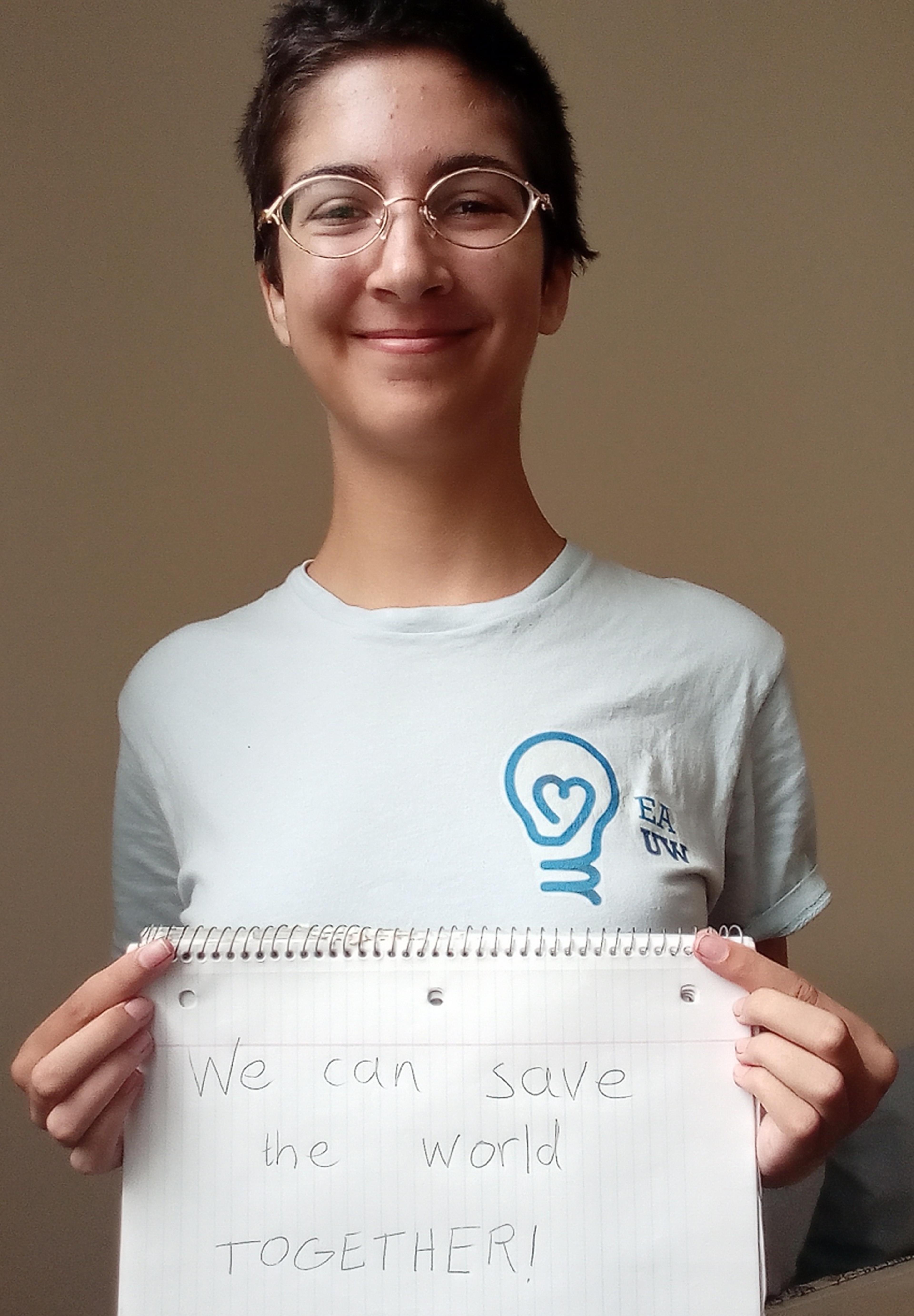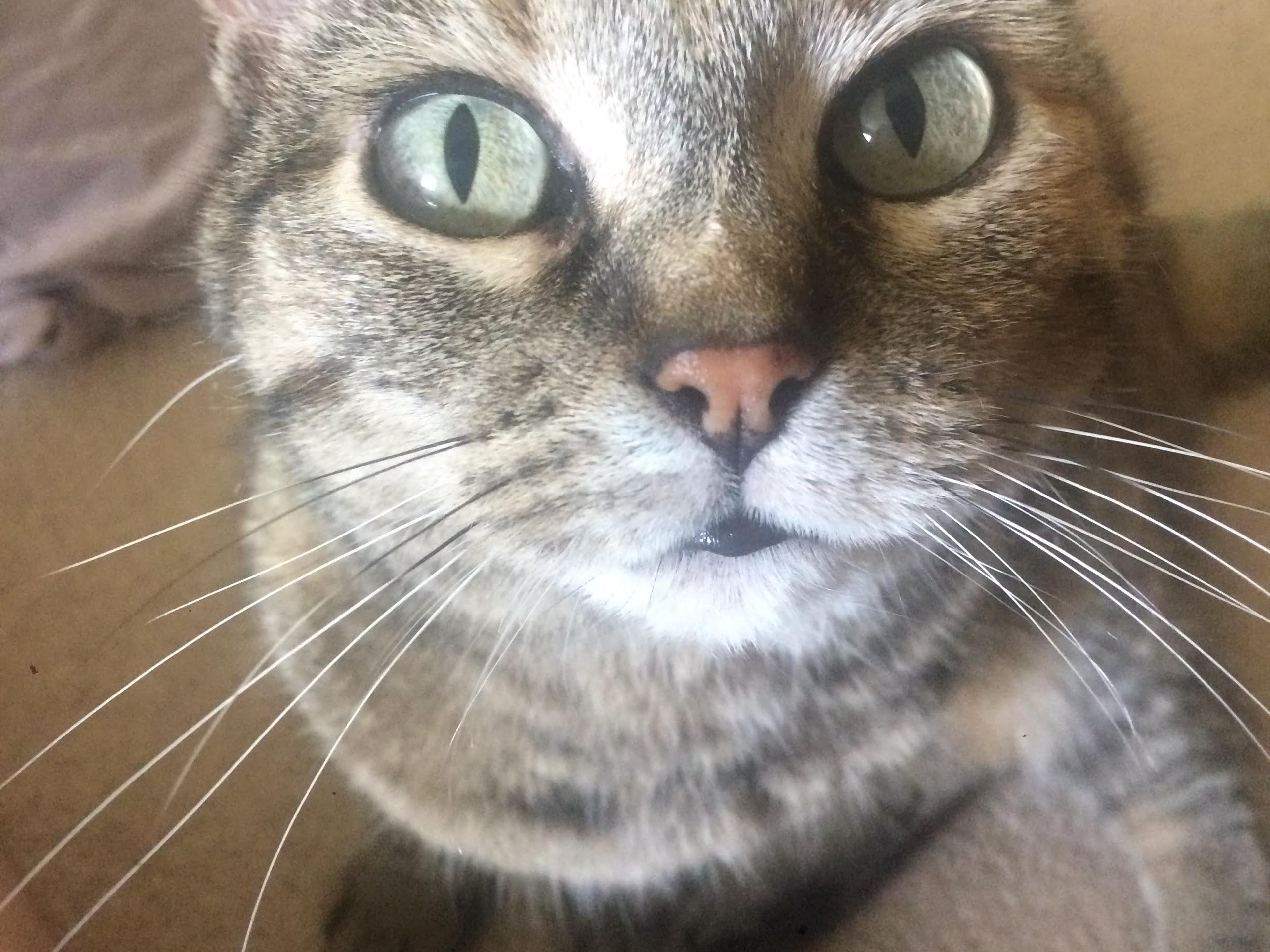This profile is part of the "People of Giving What We Can" series.

Portrait photo of Meera holding a sign that reads: We can save the world together!
We recently spoke with Meera Bradley, a computer science undergrad at UW Madison, who wants to do direct work on preventing global catastrophes using the power of software engineering.
Tell us about yourself. What keeps you busy and what makes you tick?
I love reading, puzzles, and generally overthinking the universe, whether that's physics or philosophy.
Tell us about your effective giving journey.
Ever since I can remember, I've been curious about donation. I wondered, why didn't people give more money? What was the point of having a big house if some people didn't even have houses? When I found Effective Altruism and GWWC, it felt like magic. I'd been thinking, "why doesn't this exist?" and then someone said, "it already does!"
Why do you give? (What motivated you to give originally and what keeps you motivated now?)
Originally, before learning about GiveWell or GiveDirectly, I planned to give all my donated money to low-income and homeless people in my local community. Giving money to people who need it, to me, seemed like common sense. My thinking went something like: “These people are hurting, studies say I can help, I will help.” In other words, I've felt pain, I have empathy, so I will prevent others from feeling pain where I can. Learning about GiveWell made me realise that I could do exactly the same thing — help people — but do so much more effectively by giving to organisations focused on helping people in other countries, rather than just my local community.
I consider myself a utilitarian, and have always been motivated by the basic drive of doing what I can to reduce suffering and increase joy. Discovering effective altruism and talking to people within this community has actually allowed me to broaden my thinking around morality a bit; the diversity of viewpoints within EA and its acknowledgment of moral uncertainty made me realise that I can sometimes take utilitarianism too far in my moral thinking. (I would say I am still motivated by utilitarianism, but with a dash more moral uncertainty!) This has led me to shift my focus towards reducing existential risks and suffering risks without getting bogged down in obscure ethics questions like trying to compare average utility and total utility!
Why did you take the Giving What We Can pledge?
I have been planning to donate a large percentage of my income since a few years ago when I first seriously thought about how I wanted to help others and what I wanted to do with my career. I decided to take the pledge to publicly demonstrate my commitment.
What are the issues in the world that you care most deeply about?
Reducing suffering and increasing happiness. More broadly, I care about total utility. I want every sentient being to have as many positive experiences in their lives — and as few negative — as possible. I hope that humanity will continue for a very long time and find more and more ways to create joy and meaning.
Which organisations do you give to (and why)?
I give to the Long-Term Future Fund because I want to help the possible trillions of people in our future. When I first thought about donations, I only thought about global health and development. However, I don’t currently give to any global health and development funds because since then I have learned about existential risks and decided that these are larger scale and more neglected issues.
Do you ever find it difficult to give?
I sometimes get paralyzed by indecision — where should I give? How much? That's one thing I love about GWWC. Even if the questions still remain about where I want to end up as a donor, I can take one step in the right direction, right now. Taking the pledge helps me to remember to donate a small amount now to a cause that I care about, and knowing that all of the causes listed are highly-impactful means I can start making a concrete difference now without having to do time-intensive financial planning or many, many hours of research into where to donate. I can still do those things later if I want to when I have more time, but I really like being able to feel like I’m still making a concrete difference now.
Do you try to effect change in any other way?
I plan to use my career to reduce existential risk or help animal welfare. I also enjoy telling my friends and family about my adventures in philosophy and Effective Altruism.

Meera's cat, Squeaky!
What effective giving tips would you like to share?
Giving a little is better than not giving at all. I think this applies to a lot of areas in life. It can be easy to feel paralyzed by how much suffering is going on or how much good you could do, but it can also be easy to just save one life (or save several more in expected value) right now.
What suggestions do you have for other people considering the pledge?
I suggest just jumping right in. The recommended pledge amount is pretty low if you're in a situation such as being a student and having no income, like me. It feels good to help and the worst that can happen (for most people) is that you have slightly less spending money.
What are your visions for the future?
I want to see a world where we have moved past conflict and live in harmony. Non-human animals are no longer suffering and sentient beings no longer die by violence or disease. We use our new, powerful technology to find new heights of happiness or to find out what really defines good and how to achieve it. I would also love to see humans spread across the galaxy!
Have any books, documentaries, articles or studies significantly changed the way you see giving?
Doing Good Better and The Precipice have influenced me heavily. After reading those books, I kept seeing things that seemed to line up really well with what I’d read there!
Have you found anything to be helpful in talking to people about effective giving?
I try to be open and honest about my beliefs, but also non-judgmental.
Are there any other concrete ways that Giving What We Can has helped you?
Recommending the EA funds. With the EA funds, I don’t have to do a lot of research about where to give. I can simply donate to a cause I care about and trust that there are experts doing the research.